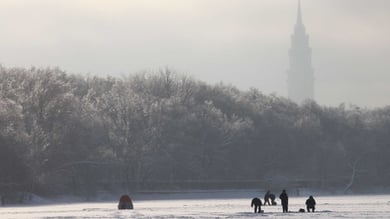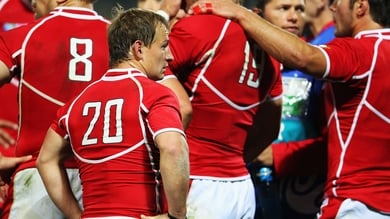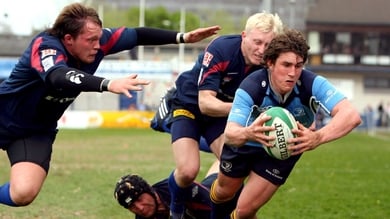By Tadhg Peavoy
Email: tadhg@peavoy.com
Following Russia’s first Rugby World Cup appearance, rugby eyes have turned to how to bolster the sport in the country and develop it beyond being a second-tier rugby nation.
Lúcás Ó’Ceallacháin is a man that has plenty of first-hand knowledge of the game in the Russian region. The Irishman studied Russian in Trinity College, before moving to Kazakhstan to further his career. Playing for a Kazakh club led to to some coaching work, which in turn, through the IRB residency rules, led to Ó’Ceallacháin playing for the Kazakhstan national team.
From those beginnings, Ó’Ceallacháin went on to work as development manager for the Rugby Union of Russia, the Kazakhstan Rugby Union and the Asian Rugby Football Union.
Now living back in Ireland and working as general manager at the Irish Olympic Handball Association, Ó’Ceallacháin believes Russia is fertile for the growth of rugby in the coming years.
“Rugby is quite strong there at the moment, there are a lot of sevens clubs in particular,” he said. “In Russia, Olympic sport is king. The Olympic slot has opened up a lot of doors for rugby in terms of funding and in terms of getting into schools; schools won’t take you seriously if you’re not an Olympic sport. The Olympic status was a major coup for Russian rugby.
“It came as part of a perfect wave for Russia: they had won the rights to hold the Junior World Rugby Trophy and Rugby World Cup Sevens; their women and men also qualified for the sevens’ World Cup back in 2009. It’s still a minority sport, but one that’s beginning to get a bit of momentum.”
However, press interest in the Rugby World Cup was limited in Russia.
“It [the RWC] wouldn’t have been picked up as much by the papers - because Russians like a winner.
"It would have been difficult for Russian fans to look at a Russian team going to a world championships not to place in the medals; it’s unusual for a Russian team in that regard.
"It’s also hard for the non-rugby Russian public to understand why the level is the way it is. That said, they did get a lot of interest through TV and a lot of the games were broadcast on Russian television.”
Ó’Ceallacháin believes weather is the biggest obstacle to Russia being brought into an expanded RBS 6 Nations competition.
“You can’t really stage a Six Nations game in the current calendar in Moscow. That’s never going to change unless global warming speeds up at a rate of knots.
Pictured below: The harsh Russian winter would prevent outdoor games during the Six Nations season.

“The clear path [for Russia] is sevens. They can be quite successful at that quite quickly, because it’s on the Olympic stage they can capture the public’s attentions, and 15s is always going to be a secondary sport in Russia. Sevens is easier to pick up for the public, in terms of understanding the rules, whereas 15s can be quite technical.
“What I would really like to see is a Russian club side challenge for an Amlin Challenge Cup spot. It’s very unlikely that there will be a relegation play-off in the Six Nations – that’s just the reality of it. There’s just too much to lose in terms of structure commercially for the Six Nations.
“I think sevens is going to paint an interesting picture for rugby over the next 20 years. It could become the number one sport of rugby.
“I think a series of friendly fixtures [for the 15s team] in the autumn would be the way to go for Russia really. It would help to convince people they would be ready to come into the Six Nations.”
Ó’Ceallacháin also points to the fact fixtures against tier-two nations would allow tier-one teams a chance to experiment at Test level.
“I think it makes sense for the home nations as well. If they’ve got games against two Southern Hemisphere teams sandwiched in against an easier opposition team – Russia or Georgia – that’s going to give you a chance to experiment. That would be a good fixture for anybody. Bringing a club game to Russia might be another way to raise the profile as well.”
One of the big worries now that the Churchill Cup has been stopped is who Russia will play on a regular basis.
“Who do they play regularly? Do you put them in against the Pacific Islanders? If you put them in against USA and Canada is that really going to improve either of those teams?”
Pictured below: Russia need more games against top-tier opposition in order to improve.

Talk of a European Cup every four years between World Cups has also been raised as a possibility in recent years, but again the calendar would prove an issue for Russia.
“The biggest challenge is the calendar - the seasons are so out of sync. We could see a situation as rugby grows that people will want to see summer rugby. If that could be scheduled in the calendar that could be good. If you offer Russia [a game with] Ireland A or England A it’s not going to have the same draw.”
With all the difficulties posed by international scheduling, a professional Russian club taking a European Rugby Cup spot seems the next step in terms of integration.
“It’s very doable. The average budget for a professional club in Russia is a million US dollars, the reason it’s that big is because of the distances they have to travel in Russia. We have players out there earning 5,000 to 6,000 dollars a month, which doesn’t sound too bad for a lot of the Irish players I’d say.
“Enisei are the Munster of Russian rugby. They’re the country boys from middle Russia and they would have surprised the Irish teams when they came over.
"They’re big bruisers but they can also throw the ball around. They beat Connacht A in April. They ran Munster A close two years ago. I think they could do better than the Romanian or Spanish teams that have been in the Amlin Challenge.
Pictured below: Ian Keatley scores a try for Leinster A against Enisei STM in April 2008.

"There’s a possibility you could have a really good indoor stadium in Moscow that could be used by a regional selection; like an Aironi or a Treviso side. As it grows you could have two clubs in there.”
Russia are also hoping to bid for the RWC 2023. Ó’Ceallacháin feels they are unlikely to host the tournament, but that the bid displays the intention to grow the sport in the country.
“[The Rugby World Cup bid] is an outside bet. But I wouldn’t be surprised if Russia get their first World Cup victory in 2015. You look at the young teams coming through and they are starting to do really well in the Junior World Trophy.
"It’s a bit worrying from the outside how quickly they’re developing these players, because they’re getting more and more access to players in schools. It means the game is going to swell in terms of numbers. Russia don’t do sport by halves.”
Tadhg Peavoy was in conversation with Lúcás Ó’Ceallacháin on 7 November 2011.

